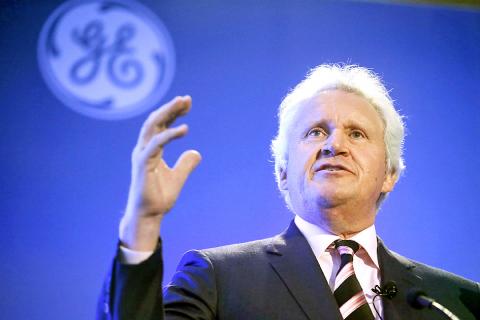General Electric Co (GE) chief executive Jeff Immelt is pledging to spend US$50 million on a series of initiatives in Boston, including US$25 million on government schools, as his company prepares to move its headquarters to the city.
The announcement came as Immelt joined Massachusetts Governor Charlie Baker and Boston Mayor Marty Walsh on Monday to unveil more details about the company’s decision to move its headquarters from Fairfield, Connecticut.
GE is to occupy two buildings and build a third in Boston’s Fort Point neighborhood.

Photo: AP
Immelt said the move would create about 4,000 temporary and permanent jobs.
Immelt said the company plans to move into temporary offices in August and ultimately bring 800 new workers to the area.
He predicted the move would inject more than US$1 billion into the local economy.

Photo: AP
Immelt said the company was drawn to Boston because of its determination not to lose out to Silicon Valley on the growth of the “industrial Internet.”
“The other thing I like about Boston is that you have a chip on your shoulder,” Immelt said. “I love that.”
Baker said GE and Massachusetts are a good match.
He said that 40 percent of workers in the state are part of the “innovation economy.”
Baker predicted that other companies would relocate to the Boston area in part because GE is doing so.
As part of the US$50 million package unveiled on Monday, Immelt said GE would fund a career laboratory to help prepare students for jobs using advanced manufacturing technology.
The company would also spend US$15 million on community health centers and US$10 million to expand diversity in the healthcare, science and technology fields.
Protesters gathered outside the press conference to highlight the millions of US dollars in tax breaks and public incentives, including the prospect of free rent on city-owned land, used to lure the company to Boston.
Susan Strelec, a 70-year-old protester from the city’s Jamaica Plain neighborhood, braved snow, wind and icy sidewalks in front of the high-rise office building where the press conference was being held to voice her concerns.
Strelec said the city and state should be more focused on improving schools, shelters for homeless people and fixing public transportation rather than offering sweet deals to big corporations.
“I hate injustice. I hate corporate greed. I hate stupidity,” said Strelec, a member of the Massachusetts Alliance of HUD Tenants, one of the groups protesting the agreement.
Walsh defended the deal, saying it would end up generating more tax revenue by renovating the two warehouses on city-owned land, rather than letting them remain as they are for the next 10 to 15 years.
Walsh also pointed to the US$25 million pledge to Boston schools by GE, which he said was a direct result of the deal.

Macronix International Co (旺宏), the world’s biggest NOR flash memory supplier, yesterday said it would spend NT$22 billion (US$699.1 million) on capacity expansion this year to increase its production of mid-to-low-density memory chips as the world’s major memorychip suppliers are phasing out the market. The company said its planned capital expenditures are about 11 times higher than the NT$1.8 billion it spent on new facilities and equipment last year. A majority of this year’s outlay would be allocated to step up capacity of multi-level cell (MLC) NAND flash memory chips, which are used in embedded multimedia cards (eMMC), a managed

CULPRITS: Factors that affected the slip included falling global crude oil prices, wait-and-see consumer attitudes due to US tariffs and a different Lunar New Year holiday schedule Taiwan’s retail sales ended a nine-year growth streak last year, slipping 0.2 percent from a year earlier as uncertainty over US tariff policies affected demand for durable goods, data released on Friday by the Ministry of Economic Affairs showed. Last year’s retail sales totaled NT$4.84 trillion (US$153.27 billion), down about NT$9.5 billion, or 0.2 percent, from 2024. Despite the decline, the figure was still the second-highest annual sales total on record. Ministry statistics department deputy head Chen Yu-fang (陳玉芳) said sales of cars, motorcycles and related products, which accounted for 17.4 percent of total retail rales last year, fell NT$68.1 billion, or

In the wake of strong global demand for AI applications, Taiwan’s export-oriented economy accelerated with the composite index of economic indicators flashing the first “red” light in December for one year, indicating the economy is in booming mode, the National Development Council (NDC) said yesterday. Moreover, the index of leading indicators, which gauges the potential state of the economy over the next six months, also moved higher in December amid growing optimism over the outlook, the NDC said. In December, the index of economic indicators rose one point from a month earlier to 38, at the lower end of the “red” light.

MediaTek Inc (聯發科) shares yesterday notched their best two-day rally on record, as investors flock to the Taiwanese chip designer on excitement over its tie-up with Google. The Taipei-listed stock jumped 8.59 percent, capping a two-session surge of 19 percent and closing at a fresh all-time high of NT$1,770. That extended a two-month rally on growing awareness of MediaTek’s work on Google’s tensor processing units (TPUs), which are chips used in artificial intelligence (AI) applications. It also highlights how fund managers faced with single-stock limits on their holding of market titan Taiwan Semiconductor Manufacturing Co (TSMC, 台積電) are diversifying into other AI-related firms.